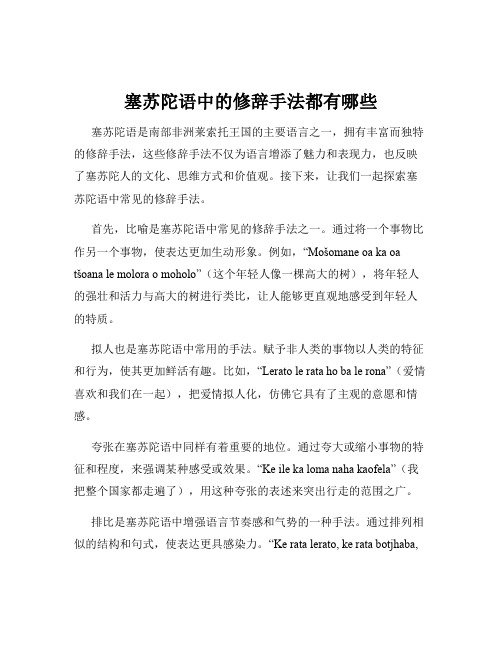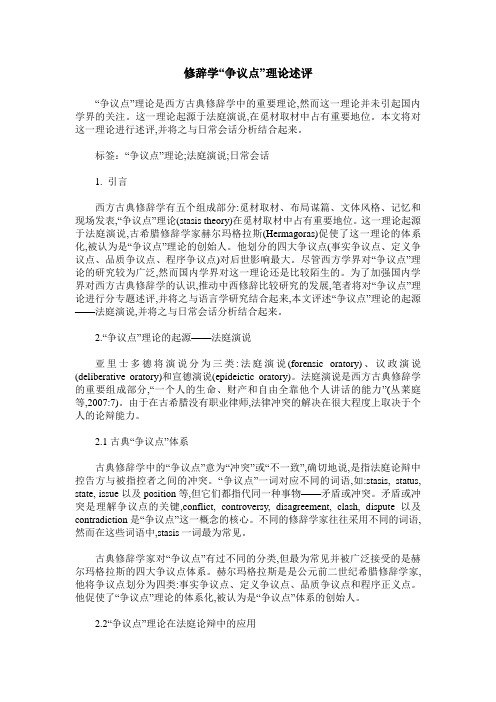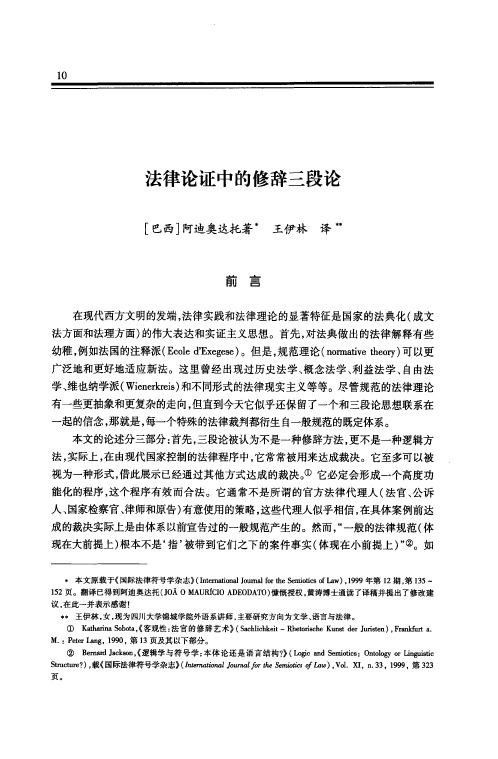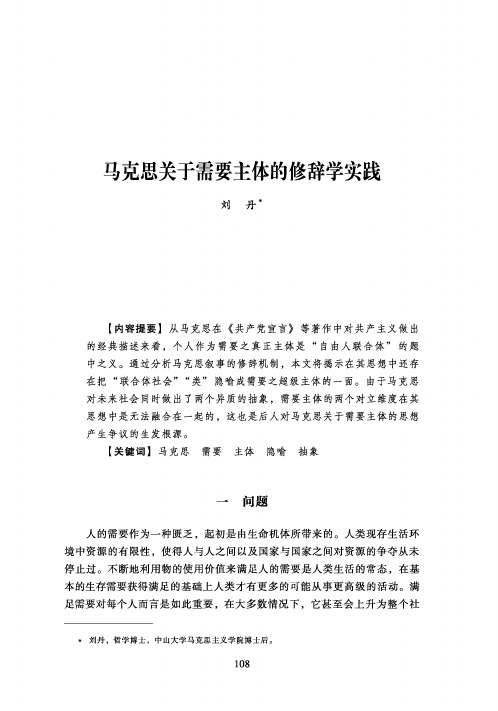修辞学 马拉碦什中的三段论运用
塞苏陀语中的修辞手法都有哪些

塞苏陀语中的修辞手法都有哪些塞苏陀语是南部非洲莱索托王国的主要语言之一,拥有丰富而独特的修辞手法,这些修辞手法不仅为语言增添了魅力和表现力,也反映了塞苏陀人的文化、思维方式和价值观。
接下来,让我们一起探索塞苏陀语中常见的修辞手法。
首先,比喻是塞苏陀语中常见的修辞手法之一。
通过将一个事物比作另一个事物,使表达更加生动形象。
例如,“Mošomane oa ka oatšoana le molora o moholo”(这个年轻人像一棵高大的树),将年轻人的强壮和活力与高大的树进行类比,让人能够更直观地感受到年轻人的特质。
拟人也是塞苏陀语中常用的手法。
赋予非人类的事物以人类的特征和行为,使其更加鲜活有趣。
比如,“Lerato le rata ho ba le rona”(爱情喜欢和我们在一起),把爱情拟人化,仿佛它具有了主观的意愿和情感。
夸张在塞苏陀语中同样有着重要的地位。
通过夸大或缩小事物的特征和程度,来强调某种感受或效果。
“Ke ile ka loma naha kaofela”(我把整个国家都走遍了),用这种夸张的表述来突出行走的范围之广。
排比是塞苏陀语中增强语言节奏感和气势的一种手法。
通过排列相似的结构和句式,使表达更具感染力。
“Ke rata lerato, ke rata botjhaba,ke rata sechaba sa rona”(我喜欢爱情,我喜欢友谊,我喜欢我们的社会),这种排比让情感的表达更加强烈。
象征手法在塞苏陀语中也经常被运用。
用某个具体的事物来代表一种抽象的概念或情感。
比如,“Kotulo e le letšoao la bophelo”(火炬是生命的象征),火炬在这里不仅仅是一个物品,更代表着生命的希望和力量。
反复则是通过重复某个词语、短语或句子,来加强语气和强调重点。
“Ke tla tla, ke tla tla”(我会来,我会来),重复“tla tla”,突出了到来的决心。
解析“修辞推论”——亚里斯多德《修辞学》核心概念

要通过深入 解读 《 修辞 学》 文本 , 对其 重要 地位 给以充分论证 , 以引起我 国修 辞学界的重视 。文章还论述 了这一概 念的各主要方 面——含 义、 特征及表现 形式,对富有争议的基本特征及表现 形式提 出了自己的理解 : 完整性 与 非 或然性 两个特征 对于“ 修辞推论” 来说 并非同时必需, 但应至少满足其 一; 修辞推论 ” “ 共可 以有七种表现形 式。本 研究将为“ 修辞推论” 的应 用性探 索提供理论基 础
一
辑的观点看 < 修辞学 >》 (94 )该文集 中论述 了 ” 19. , “ 辞推论” “ 目” 修 与 部 的关 系 ; 武宏志 , 丁煌 的 《 冒 假
的修 辞 式 推论—— 亚 里 土多 德 < 辞 学>的谬 误 修
论》 19 ) 文章分 析了亚 里士多德 论及的几 个假 冒 (9 4 ,
修辞运作模式 》(0 3 , 2 0 ) 论述 了 “ 修辞三段论” “ / 修 辞推论 ” 的三种表现形式及其在广告 中的应用。 对上
述有关 “ 修辞推 论” 的基本特征及表现形式研究 , 本
文通过深入解读 《 修辞学》 文本 , 提出 了新 的观点 : 非 完整性 与或然性两个 特征对于“ 修辞 推论 ” 来说并 非 同时必须 , 但应至少满足其一 ; 修辞推论 “ ’ 可以 总共 有 七种表现形式 。文章还对 “ 修辞推论 ” 在亚里斯 多 德《 修辞学》中的核 心之 核心地位作了充分证 明, 并
部分。 (9 I9 其根据是这一卷对后世欧洲修辞 学 ” 19 : ) 和散文风格有很 大影 响。 在译后 记中他又重 申“ 三 第 卷讨 论演说的形式—— 风格 与安 排 ,相 当于我们今
大” 19:1) 3 “ ( 127 ; .修辞推论” “ 目” 9 、部 都是 较为复 杂的概念 , 缺乏对 《 修辞学 》 的深入 研读 及对 古典修
修辞三段论在古文中的运用论文

修辞三段论在古文中的运用论文修辞三段论在古文中的运用论文1.引言亚里士多德首创科学的修辞学,提出了一系列有深远意义的原则,其中最为重要的就是修辞三段论(enthymeme),是西方古典修辞学的核心和灵魂。
近年来,对修辞式三段论的研究层出不穷,大部分都限定在法律、自然科学、政治以及广告等语体中。
其实并非如此。
修辞三段论早在我国古代,就被文人墨客广泛用于诗词、格言和文言文之中,以达到影响或劝说他人的目的。
本文试探讨修辞三段论的特点以及它在我国古代文体中的运作。
2.修辞三段论的特点“修辞三段论”意思是演说式的推论,原文是enthymema(恩梯墨玛)。
修辞三段论采用连续讲述的方式,它不像论辩式推论那样面向少数观众,而是面向各种各样的人组成的听众,其目的就是影响听众,使他们信服并接受自己的观点。
这样,修辞三段论的三个构成元素就包含一个大前提,一个小前提和一个结论,而且其中一个前提是可以省略的。
例如下面的一个例子:中国人是勤劳善良的,我是中国人,所以我是勤劳善良的。
这是一个完整的三段论式推理,大前提是“中国人是勤劳善良的”;小前提是“我是中国人”;推理出的结论是“我是勤劳善良的”。
若一前提或结论省略时,其修辞三段论形式可表达为:1)中国人是勤劳善良的,所以我是勤劳善良的。
(“我是中国人”被省略)2)我是中国人,我是勤劳善良的。
(“中国人是勤劳善良的”被省略)3)中国人是勤劳善良的,我是中国人。
(“我是勤劳善良的”被省略)这表明,修辞三段论中的两个前提和结论可以省略其中的任何一个,通过剩下的两方来推理得出。
上述例证还表明修辞式推论的前提是属于人类行动范围的或然的事,所以根据这种前提推出的结论也是或然性的,这是修辞三段论和逻辑三段论的本质区别。
后者是基于必然性基础之上的,不生成知识。
其前提和结论早已经过论证存在一种必然的联系,所得出的结论不是新知识,而是人们公认的真理或事实。
但修辞三段论生成知识,因为它是在论辩的过程中形成的。
修辞学争议点理论的发展历程

2023-11-10•修辞学争议点理论的起源•修辞学争议点理论的发展•修辞学争议点理论的演变•修辞学争议点理论的影响及贡献•修辞学争议点理论的未来发展及趋势目•总结录01修辞学争议点理论的起源古代修辞学的起源古希腊时期修辞学最初起源于古希腊,当时被广泛应用于公共演讲和辩论中。
罗马时期罗马修辞学家对古希腊修辞学进行了传承和发展,形成了自己的修辞理论。
中世纪时期在中世纪,修辞学被引入到大学教育中,成为文学和哲学学科的一部分。
010302争议点理论的概念及特点概念争议点理论是指通过分析和研究争议点,来揭示修辞学的本质和规律。
特点具有系统性、动态性和开放性。
该理论强调对争议点的分类、分析和解决,以揭示修辞学的本质和规律。
同时,争议点理论也是一个动态的过程,随着社会和文化的发展而不断变化。
此外,争议点理论也强调开放性和包容性,吸纳不同学科和领域的观点和方法。
争议点理论在修辞学中的地位核心地位争议点理论在修辞学中占据着核心地位,是修辞学研究的重要方向之一。
跨学科性争议点理论不仅适用于文学和语言学领域,也适用于其他学科和领域。
通过对争议点的分析和研究,可以促进不同学科之间的交流和融合。
实践价值争议点理论不仅具有理论价值,还具有实践价值。
在法律、政治、商业和教育等领域中,争议点理论都可以被广泛应用于解决实际问题。
01020302修辞学争议点理论的发展中世纪时期的争议点理论起源与背景中世纪欧洲修辞学发展迅速,争议点理论在这一时期开始萌芽。
学者们开始关注如何有效地传达信息、说服听众,并探讨背后的道德和伦理问题。
主要观点与思想中世纪修辞学强调使用例证、权威和逻辑推理来支持自己的观点。
争议点理论则关注如何通过巧妙运用例证、故事和隐喻等手法,让听众更容易接受并认同某一观点。
影响与贡献中世纪修辞学的发展为后来的争议点理论提供了基础和指导方向。
同时,这一时期的学者们也开始认识到修辞学的道德和伦理问题,为后来的相关研究提供了启示。
关于亚里士多德修辞学三段论理论

关于亚里士多德修辞学三段论理论李娟 1002班 2010103010224首先,在研究亚里士多德的修辞学三段论时,我们必须明确什么是修辞学。
在黎千驹的《模糊修辞学导论》中他指出:修辞学是研究在语言交流活动中如何精心地选择语言材料来表达意旨,交流思想,以提高语言表达效果的方法、原则和规律的一门学科。
简言之,修辞学应该是研究有效的交流,写作和一门关于说服的学科。
我们或许可以说修辞就是一门使你在交流过程中语言更具说服力与美感的工具,它主要有修饰,润色的作用。
在亚里士多德对修辞学的研究中,他认为一篇好的具有说服性的文章应该需要logos(逻辑), pathos(情感), ethos(人格)。
由此可见他强调的是对说服方式的探讨和对修辞能力的培养。
那么这三段论包含哪些呢?Logos—逻辑。
“譬称以喻之,分别以明之”,英语 logic逻辑一词来源于希腊语 logos 。
Logos本身应含有比逻辑更广泛的含义。
区别于pathos, ethos, logos是用语言本身所具有的事实逻辑、因果关系完成对读者的劝说。
它可以通过理论、概念、引用、事实数据、文字或历史演绎、权威专家的引语、公正的看法等达到其说服的目的。
Pathos—情感。
“欣驩芬芗以迎之,贵之,神之”,它与感情,同情,悲悯等词相关。
它通过打动听众的情感世界,使其非理性地接受说话者的说服。
它可能涉及任何一种情感:爱、恨、恐惧、怜悯、愧疚、欢乐、痛苦,抑或集体主义精神、爱国主义精神等。
Pathos主要表现在语言内容上的打动,语言形式上的打动。
它需要获得“听众的自我认同,自我意识,情感震撼。
”Ethos—人格。
“矜庄以莅之,端诚以处之,坚强以持之”。
基于说话人的信誉性,可信性。
它通过说话人的态度和人品特征使听众相信其语言的真实性。
将论辩的语言魅力上升到极致的内在原因。
归纳来说,理性(logos)则从文本的角度出发,关注文本的构成。
情感(pathos)从读者的角度出发,关注读者的情感特点。
修辞学“争议点”理论述评

修辞学“争议点”理论述评“争议点”理论是西方古典修辞学中的重要理论,然而这一理论并未引起国内学界的关注。
这一理论起源于法庭演说,在觅材取材中占有重要地位。
本文将对这一理论进行述评,并将之与日常会话分析结合起来。
标签:“争议点”理论;法庭演说;日常会话1. 引言西方古典修辞学有五个组成部分:觅材取材、布局谋篇、文体风格、记忆和现场发表,“争议点”理论(stasis theory)在觅材取材中占有重要地位。
这一理论起源于法庭演说,古希腊修辞学家赫尔玛格拉斯(Hermagoras)促使了这一理论的体系化,被认为是“争议点”理论的创始人。
他划分的四大争议点(事实争议点、定义争议点、品质争议点、程序争议点)对后世影响最大。
尽管西方学界对“争议点”理论的研究较为广泛,然而国内学界对这一理论还是比较陌生的。
为了加强国内学界对西方古典修辞学的认识,推动中西修辞比较研究的发展,笔者将对“争议点”理论进行分专题述评,并将之与语言学研究结合起来,本文评述“争议点”理论的起源——法庭演说,并将之与日常会话分析结合起来。
2.“争议点”理论的起源——法庭演说亚里士多德将演说分为三类:法庭演说(forensic oratory)、议政演说(deliberative oratory)和宣德演说(epideictic oratory)。
法庭演说是西方古典修辞学的重要组成部分,“一个人的生命、财产和自由全靠他个人讲话的能力”(丛莱庭等,2007:7)。
由于在古希腊没有职业律师,法律冲突的解决在很大程度上取决于个人的论辩能力。
2.1古典“争议点”体系古典修辞学中的“争议点”意为“冲突”或“不一致”,确切地说,是指法庭论辩中控告方与被指控者之间的冲突。
“争议点”一词对应不同的词语,如:stasis, status, state, issue以及position等,但它们都指代同一种事物——矛盾或冲突。
矛盾或冲突是理解争议点的关键,conflict, controversy, disagreement, clash, dispute 以及contradiction是“争议点”这一概念的核心。
麦考密克法律推理理论探究——解读《修辞与法治:一种法律推理理论》

三段论基础知识

三段论基础知识嘿,朋友!今天咱来聊聊三段论这玩意儿。
啥是三段论?就好比你要去一个地方,得先知道从哪儿出发,经过哪儿,最后到达哪儿。
三段论也是这么个理儿。
比如说,“所有人都会死,苏格拉底是人,所以苏格拉底会死。
”这就是个典型的三段论。
三段论有大前提、小前提和结论。
大前提就像是个大方向,小前提是具体情况,结论就是最终得出的结果。
你想想,要是没有大前提,那不就像在黑夜里走路,没个方向,能走到哪儿去?小前提也重要啊,要是不准确,那得出的结论不就跑偏啦?再举个例子,“所有的鸟都会飞,麻雀是鸟,所以麻雀会飞。
”这是不是很好理解?但要是说“所有的鸟都会飞,鸵鸟是鸟,所以鸵鸟会飞。
”这可就不对啦!为啥?因为鸵鸟虽然是鸟,但它不会飞呀,这就是小前提出了问题。
三段论看起来简单,可一不小心就容易犯错。
比如说,“会游泳的都是鱼,海豚会游泳,所以海豚是鱼。
”这显然不对,海豚可不是鱼呀!这就是没搞清楚概念,把大前提给定错了。
咱平时说话、思考,其实经常会用到三段论,只是可能自己都没注意。
比如说,“学习好的同学都努力,小王学习好,那小王肯定努力。
”学会三段论,能让咱的思维更清晰,说话更有条理。
比如说和别人争论问题,用三段论来分析,就能一下子抓住关键,让人信服。
你再想想,如果大家都不懂三段论,那交流起来得多乱套?就像一群没头的苍蝇,到处乱撞。
所以说,三段论这基础知识可得好好掌握,它能帮咱在思考的道路上走得更稳当,说话更有底气。
别小看这小小的三段论,它的作用可大着呢!。
法律论证中的修辞三段论

(
Re ci f e)
地方 法 院
的 具 体 法律 裁 决 它 试着 展示 这些 裁 决 的 真 实 源 头 展 示 它 们 在 多 大 程度 上 符 合 论证
1 ,
据说裁 决就 是 以 这些 论证 为 基础 也 就是 以 明 确 的 国 家规 范为 基 础
,
1 。
一
'
作 为 修辞 学概念的 修辞三 段 论
。
(
I
n t em ati o n a
Hou m a
i f r t e i t i cs f 1 1 ) , , 1
o
h
S em o
o
Law
99 9
年第
2
期 第
35
 ̄ 1
1
52
页
翻 译 已 得 到 阿迪 奥 达托
一
(
J
O A 0 MA UH f CI O A DE0 D A T 0 ) 慷 慨 授权 黄 涛 博 士 通 读 了 译 稿 并 提 出 了 修 改 建
、 、
、
由
法
(
W
i e n er k rei s
)
和 不 同 形式 的 法 律 现 实 主 义 等 等
一
。
尽 管 规 范 的 法 律理 论
有
一
一
些 更 抽 象 和 更 复杂 的 走 向 但直 到 今天 它 似 乎 还 保 留 了
,
一
个 和三 段论 思 想 联 系 在
起 的信 念 那 就是 每
, ,
个特殊 的 法 律裁 判 都衍生
,
。
最 后 本文 也 暗 示 了 在 教 义性 法
, ,
修辞学第三章

纵观社会发展至今,西方修辞有着其自身的走向和变化, 纵观社会发展至今,西方修辞有着其自身的走向和变化,拓宽了修辞学的学科 古典修辞学, 范围。在西方修辞学史上有着古典修辞学 中世纪修辞学,文艺复兴修辞学,18世 范围。在西方修辞学史上有着古典修辞学,中世纪修辞学,文艺复兴修辞学,18世 纪修辞学,19世纪修辞学 现代修辞学,和后现代修辞学, 世纪修辞学, 纪修辞学,19世纪修辞学,现代修辞学,和后现代修辞学,不同时期有不同的历史 发展和特征他们都存在着各自的学术内容为我们做深入的研究。 发展和特征他们都存在着各自的学术内容为我们做深入的研究。 古典西方修辞学的起讫时间大约从公元前500年至公元400 500年至公元400年 古典西方修辞学的起讫时间大约从公元前500年至公元400年,即古希腊古罗马 欧洲古典文化极其辉煌,灿烂的时期, 欧洲古典文化极其辉煌,灿烂的时期,西方修辞学的起源在西方学术界也有着分歧 较为赞同的观点是克拉克斯 Corax)和提西阿斯(Tisias) 克拉克斯( ,较为赞同的观点是克拉克斯(Corax)和提西阿斯(Tisias)是修辞学的创始人 然而根据记载,亚里士多德认为克拉克里是最早编写修辞学课本的人。 ,然而根据记载,亚里士多德认为克拉克里是最早编写修辞学课本的人被视为西方的 西方的“ 们认为克拉克斯和提西阿斯是古希腊修辞学的创始人,被视为西方的“修辞学之父 西方许多学者继承和发展了修辞学,著名的修辞学家有克拉克、 ”。西方许多学者继承和发展了修辞学,著名的修辞学家有克拉克、谱罗塔歌拉斯 Protagoras)、高尔吉亚(Gorgias) 柏拉图(Plato) 苏格拉底(Socrates) )、高尔吉亚(Gorgias)、 (Plato)、 (Socrates)、 (Protagoras)、高尔吉亚(Gorgias)、柏拉图(Plato)、苏格拉底(Socrates)、伊 索克拉底(Isocrates) 亚里士多德(Aristotle) 其中由亚里士多德最为著名。 (Isocrates)、 (Aristotle), 索克拉底(Isocrates)、亚里士多德(Aristotle),其中由亚里士多德最为著名。在 修辞理论的探索方面,亚里士多德对修辞学所下的定义是: 修辞理论的探索方面,亚里士多德对修辞学所下的定义是:修辞学是一门发现适用 于任何主题的劝说方式的艺术。 于任何主题的劝说方式的艺术。现今的古典修辞学其实就是亚里士多德的理论体系 以及西塞罗和昆提利安对这一理论体系的进一步发挥。 以及西塞罗和昆提利安对这一理论体系的进一步发挥。他们完成了西方修辞学的第 一个时期的发展——古典修辞学。这一时期的修辞学的主要特点是口头的,劝说性 古典修辞学。 一个时期的发展 古典修辞学 这一时期的修辞学的主要特点是口头的, 古典修辞学主要把修辞应用于法庭辩论和政治演讲。由此可知, 的,古典修辞学主要把修辞应用于法庭辩论和政治演讲。由此可知,传统修辞学以 演讲术”为主导、单向“劝服”为次等。 “演讲术”为主导、单向“劝服”为次等。
麦考密克的法律修辞学理论探析

麦考密克的法律修辞学理论探析麦考密克(Neil MacComick,1941-2009),英国着名法哲学家,扞卫了分析实证主义法学传统,是当代世界法律哲学领域中最重要的人物之一。
分析法理学之"分析";属性,内蕴于实践理性的法律推理理论,显示于法律修辞论证理论之中。
因此,梳理与分析麦考密克的法律修辞学理论,不但对于深层了解麦考密克的法律方法理论大有帮助,而且对中国的法律修辞学研究具有重要启示价值。
一、法律论证的修辞功能法律论证的"说服力";选择,促使思考法律三段论方法的修辞转型,还需阐释演绎证立的法律方法地位。
(一)法律论证的"说服力";选择麦考密克认为,为好的法律推理进行阐述和说明的整个活动,均需在法律秩序的各种基本价值之下进行,因此以该类价值为语境的法律推理活动是说服性的而非证明性的,以英国、欧盟国家的诸多案例裁决为例,试图勾勒出法律语境中真正有说服力的论证特性,这是对"新修辞学";的某种贡献;修辞学自身将是那个可以用来试图在这两个明显相互矛盾的常识之间找到一种有说服力的调和或平衡的东西。
18法律修辞学试图勾勒出法律语境中真正有说服力的论证之特性,旨在对那些让我们能够(如果我们还能够的话)在较好论证和较差论证、更具理性说服力的论证和更不具有理性说服力的论证之间做出区分的论证优缺点确立起一种看法。
前言3对相互竞争论证的相关分量予以评价过程,注定是个多、少问题,是个观点问题,需要做出判断。
若各种论证常常看似势均力敌,则我们如何才能确定哪一个论证更强、更有力呢?我们几乎从来不敢肯定,不像我们在证明性论证当中那样可以肯定,因为在证明性论证中把前提认作是不证自明的或由经验证明为真的真理,使得我们能够从那些前提当中推导出一项只要其前提站得住脚则不可置疑的结论,在法律中,主观确信有时是可能的,法律跟真理关系不大,而只关乎能依据法律程序和证明标准予以证明的、可适用于任何被法律视为相关且可采纳证据;只要法律是各种法律诉求或控告以及法律辩护的基础,法律就是属于某种可争辩东西,但有时并不总是终局性的,但一直至少是说服性的。
[演绎法,演绎法,马克思主义]浅谈马克思主义的归纳
![[演绎法,演绎法,马克思主义]浅谈马克思主义的归纳](https://img.taocdn.com/s3/m/31897f0dce2f0066f4332265.png)
浅谈马克思主义的归纳——演绎法归纳演绎法是马克思主义的辩证思维方法(即分析综合法、归纳演绎法、抽象具体法及逻辑历史法)之一,是辩证思维方法中比较基础和重要的方法。
归纳法是指从个别事实走向一般概念、结论,是从个别上升到一般的思维运动;演绎法是指从一般理论、概念走向个别结论,是从一般到个别的思维运动。
现实生活中,人们往往将归纳与演绎对立起来,谈论二者的统一比步于二者关系的密不可分,没有彻底解决二者的统一。
马克思主义的归纳演绎法追溯其哲学基础,发掘二者统一的中介,从而彻底解决二者的统一问题。
1.归纳与演绎相统一的哲学基础一般与个别的辩证关系作为归纳与演绎相统一的哲学基础,构成并指导了归纳与演绎的辩证关系。
1.1一般与个别的内涵一般与个别,即共性与个性,是马克思主义哲学中的基本范畴之一。
一般是指某类事物所普遍具备的特征,即该类事物的共性;个别则指单个事物具备的特性,即该事物区别于他事物的个性。
由此,一般与个别的关系既是共性与个性的关系,也是普遍性与特殊性的关系。
个别是相对于共性来讲的,即世界上某一事物或现象所反映的区别于他物的特殊性和差异性;而一般是相对于世界上一类事物或一切事物所反映的事物之间相互联系和统一的普遍性、统一性来讲的。
显然,个别既可以理解为某一事物所具有的个性,也可以理解为这一事物本身。
同理,一般既可以理解为一类事物或一切事物所具有的共性,也可以理解为这类事物本身。
总之,一般与个别既可以作为事物的属性来理解,也可以作为事物本身来理解。
个别与一般是一对范畴,双方不能离开彼此而单独存在。
同时,两者的划分并非绝对,需要考察两者所存在的具体环境。
例如,中国相对于各省市而言,是一般;相对于世界而言,则是个别。
可见,一般与个别具有对立统一的关系。
同时,事物发展是由多层次性的面貌存在,使一般与个别又具有诸多环节,即一般、特殊与个别的。
如从地域范围来讲,世界、中国、各省市的关系则是一般、特殊、个别的关系。
马克思关于需要主体的修辞学实践

马克思关于需要主体的修辞学实践刘丹**刘丹,哲学博士,中山大学马克思主义学院博士后。
【内容提要】从马克思在《共产党宣言》等著作中对共产主义做出 的经典描述来看,个人作为需要之真正主体是“自由人联合体”的题 中之义。
通过分析马克思叙事的修辞机制,本文将揭示在其思想中还存 在把“联合体社会” “类”隐喻成需要之超级主体的一面。
由于马克思 对未来社会同时做出了两个异质的抽象,需要主体的两个对立维度在其 思想中是无法融合在一起的,这也是后人对马克思关于需要主体的思想 产生争议的生发根源。
【关键词】马克思 需要 主体 隐喻 抽象一问题人的需要作为一种匮乏,起初是由生命机体所带来的。
人类现存生活环 境中资源的有限性,使得人与人之间以及国家与国家之间对资源的争夺从未 停止过。
不断地利用物的使用价值来满足人的需要是人类生活的常态,在基 本的生存需要获得满足的基础上人类才有更多的可能从事更高级的活动。
满 足需要对每个人而言是如此重要,在大多数情况下,它甚至会上升为整个社马克思关于需要主体的修辞学实践会的行动目标之一。
此间发生的事情复杂精妙,无法一语概之,值得我们认真反思的是,在这样的上升过程之后,个人究竟还是不是其需要的真正主体。
马克思对这个问题是有自己的洞见的,在他看来,在资本主义社会中,无论是资产阶级的需要还是无产阶级的需要,都只是资本的需要,无形无状的资本取代个人成为个人需要的真正主体,在此意义上,我们亦可称资本为人之需要的超级主体。
①可以说,马克思开启了对“消费社会”的批判之先河。
百年之后的马尔库塞、弗洛姆和鲍德里亚等人在对作为消费社会的资本主义社会之批判中处理的也是这一问题。
马克思所做的工作并未止步于此,马克思设想到,与资本主义社会中的人类需要状况相反,在未来的自由人联合体社会中,每个人都将各尽所能、按需分配,每个人都将成为其需要的真正主体。
然而,有证据表明,在马克思对未来人类需要状况的构想中,还存在对需要之超级主体维度的不自觉暗示,此时的超级主体不再是资本,而是作为整体的未来社会和类。
如何运用叙述人称的方法

如何运用叙述人称的方法作者在提炼出正确深刻的主题,选好了典型材料之后,把思想、观点等用一定的方式方法告诉给读者,称为表达。
它是一切文章中不可缺少的一个重要组成部分。
一篇文章,如果作者提炼出的主题思想很好,而没能用恰当的方式方法表现这一主题,那么可以说这篇文章就缺乏表现力,或者说没有完美的艺术性。
因此,我们写文章要做到:政治和艺术的统一,内容和形式的统一,内容和尽可能完美的艺术形式的统一。
在这方面,马克思给我们树立了榜样:“马克思是个严格的修辞家—他常常很费时、很费力地搜求正确的表现法”,“他对他的写作从没有感到满意过,修改了又修改,并且总是觉得文字表现没有达到思想所达到的高度。
”(拉法格、李卜克内西《回忆马克思》)。
文章的表达方法一般有叙述、描写、抒情、议论四种。
这四种表达方法经常是互相联系,互相补充的,但在不同的文体中运用时又各有侧重。
现分别介绍如下:叙述叙述是作者对作品中的人物、事件、环境的发展变化所作的介绍、交代、说明。
通过叙述,把物、事件的概貌反映出来,把分散的场景和故事片断贯串起来。
叙述是写文章的一种很重要的、基本的表达方式。
叙述的基本要求是明白具体,清楚畅达。
叙述的人称作者叙述要有个立足点,也就是从什么角度来进行叙述,这就是人称问题。
一切叙述往往用第一人称或第三人称来表达。
有的通篇只用第一人称或第三人称,有的又是两种人称交替使用。
如:鲁迅先生的作品《孔乙己》采用第一人称,《药》采用第三人称,《祝福》兼用第一人称与第三人称。
这几种写法都各有特点,用什么人称要看主题与内容的需要而定。
用第一人称的写法,把作品中的人物事件写成好像是“我”亲身经历或是写成“我”的所见所闻,它能使读者产生一种真实而亲切的感觉。
这种写法对于作者来说,便于直接表达思想感情,但是如果处理不当,由于受到“我”的活动范围的限制,作品中人物活动、事件展开的面就不够广阔。
第三人称的写法是一种间接表达的方式。
作者不露面,直接让人物的经历和事件的变化展示在读者面前。
关于因明论式与三段论实际运用_辩论演讲稿_

关于因明论式与三段论实际运用1.因明学定义:即关于宇宙万法及人生因果的哲学与逻辑。
2.藏传因明学的历史:创始于古印度尼也耶学派,后来由佛教的历代大师,通过辩论逐渐发展创立的。
因明论式与三段论人类社会中,所涉及的所有问题,都可以辩论。
所有的辩论,都可以固定的因明论式来辩。
只要熟识了因明论式,心智没有太大的障碍,就可以参加辩论。
因明论式和西方的形式逻辑的三段论有相似之处。
举一个三段论式的例子:大前提:凡是白色都是颜色。
小前提:白海螺的颜色是白色。
结论:白海螺的颜色是颜色。
此中共有三词:白色,颜色,白海螺的颜色,颜色是「大词」,白色是中词,白海螺的颜色是「小词」。
可以看出,三段论法的构成是:大前提=中词+大词小前提=小词+中词结? 论=小词+大词而一个完整的因明论式,也有三词:前陈=有法,后陈=所立法因=理由。
例如:白海螺的颜色应是颜色因为是白色」此论式中,白海螺的颜色是前陈,颜色是后陈,白色是因。
前陈又称作有法、诤依,相当于逻辑中的小词。
后陈又称作所立法,相当于形式逻辑中的大词。
因就是理由,相当于形式逻辑中的中词。
因明论式与三段论法的构成比较如下:前陈+后陈,因故或:有法+所立法,因故即:小词+大词,中词故。
宗=前陈+后陈=有法+所立法=小词+大词=结论。
前陈+因=有法+因=小词+中词=小前提。
因+后陈=因+所立法=中词+大词=大前提因明论式的实际运用辩论一开始,先确认辩论的主题。
先由攻方提出辩题。
攻方:滴——有人这样认为,凡是颜色都是红色。
守方:同意(或者不一定)!这是开场的仪式。
滴是文殊菩萨的心咒,代表智慧,表示辩论的目的是在于增进双方的智慧。
接下来才是正式辩论的第一步:攻方:你认为,凡是颜色都是红色吗?守方:同意(假设)!攻方:白海螺的颜色,是红色吗?(给出破式)守方:为什么?攻方:白海螺的颜色,应是红色,因为是颜色啊!(给出根本破式)(你不是认为所有的颜色都是红色吗)守方:因不成。
(守方不同意白海螺的颜色是颜色)攻方:我们还以白海镙的颜色来说,它总是是颜色吧,因它是白色。
三段论和归纳法在亚里士多德哲学和修辞学中的不同运用

三段论和归纳法在亚里士多德哲学和修辞学中的不同运用郝如意
【期刊名称】《平顶山学院学报》
【年(卷),期】2014(029)003
【摘要】三段论和归纳法在亚里士多德的思想体系中具有两种完全不同的运用:在哲学中归纳法为三段论提供真实必然的初始前提,三段论保证推理过程的必然性,其结果是科学知识;在修辞学中,归纳法表现为例证,三段论表现为论证,两者都不要求必然性,其结果是说服.亚里士多德对于三段论和归纳法的两种运用确立哲学和修辞学的紧密联系,促进了修辞学的诞生.
【总页数】4页(P28-31)
【作者】郝如意
【作者单位】河南师范大学,河南新乡453007
【正文语种】中文
【中图分类】B12
【相关文献】
1.从修辞学角度看亚里士多德政治哲学的理想与现实 [J], 余友辉
2.返回亚里士多德的哲学修辞学 [J], 陈伟
3.德摩根的三段论与亚里士多德三段论之比较研究 [J], 刘邦凡;郭春丽
4.亚里士多德三段论与其他传统三段论之区别 [J], 余维发
5.为什么中国古代哲学家没有发现三段论?——亚里士多德和中国古代哲学家的比较研究 [J], 金观涛;刘青峰
因版权原因,仅展示原文概要,查看原文内容请购买。
- 1、下载文档前请自行甄别文档内容的完整性,平台不提供额外的编辑、内容补充、找答案等附加服务。
- 2、"仅部分预览"的文档,不可在线预览部分如存在完整性等问题,可反馈申请退款(可完整预览的文档不适用该条件!)。
- 3、如文档侵犯您的权益,请联系客服反馈,我们会尽快为您处理(人工客服工作时间:9:00-18:30)。
As You See ItWith the finishing of the University Entrance Examination, I have remembered the last class of mine in senior high school again. Different from others days, the days we all addicted to the book, the exercise, the discussion. We were so silent that even we can hear the breath of each other, but the voice from the man, who always called antique by us, is my head teacher.Out of the window, the rain was washing the leaves; the wind was sweeping the top of tree, the birds up and down was seeking their nest. Inner the window, everyone lower their head, I guessed that some of them were weeping with the last song when I walked through your window sung by a girl. Listened the voice, my heart like a stone fall into water-plop, I cannot help myself from crying. Suddenly, the sound was interrupted by a rushed voice out of the door, the bell rang, and we had known that we had to finish the class.A study of logos, pathos and ethos applied in “Marrakech”For Aristotle, logic deals with universal and verifiable truth, while rhetoric deals with probable truth, that is, opinion and beliefs that can be advanced with greater or lesser certainty. As to the latter one, it called artistic proofs-fall within the province of art of rhetoric. Aristotle maintained that artistic proofs rely on three means of persuasion: logos, pathos, and ethos. He thinks that a persuasive essay must own that three means-logos, pathos and ethos. Refers to the Marrakech, Orwell successfully depicts the poverty of the inhabitants of Marrakech by describing the various aspects of their life to try to present a clear picture of the poverty of the people. To attach the purpose, in rhetoric, Orwell has a good use of the logos, pathos and ethos.Logos, or rational appeal. It uses logical language and the relationship between cause and effect to appeal to the audience’s reasoning or understanding. That is to say, in Logos, it always by theory, concept, quotation or historical facts, authority views and related law to achieve the goal. There are two basic approaches people often use for logical reasoning: deduction and induction. About this point, we can see Orwell shows six almost unrelated scenes, except for the fact that they demonstrate the“invisibility”of the people in Morocco, which are: the corpse scene, the gazelle-Arabian scene, the Jew-cigarette scene, the landscape scene, the donkey-woman scene, and the bird-soldier scene. Orwell in deductive way to organize the essay, by the different scenes described, the author try to appeal the understanding of audience about the hard life in Marrakech. All the scenes were saw by the author self, which are objective descriptions and enforce the authentic. And among the essays, the large amount of quotation of the conversation from local people. Besides, Orwell wrote the whole passage in intensive logical structure and language-the transition words like “as”, “but “and “when”used in the beginning of some paragraphs. All above show the full use of Logos in the essay.Pathos, or emotional appeal. It always related to emotion and sympathy. It usually arouses the strong affective feelings of the audience or reader to accept something unreason. Pathos refers to any affection, such as love, hatred, anger, ambition, fear, pity, jealously and sympathy, etc. People expressed Pathos by the language content to acknowledge others’ identity or strong emotion. Effective appeals to the audience’s emotion depend upon the skillful, and often witty, handling of language, frequently accompanied by exposure and eloquence. Exposure evokes moral indignation by condemning the unjust reality or revealing the difference between how things should be and how they. Eloquence refers to language used powerfully and fluently to appeal to people’s nobler emotions, like the sense of honor, love of one’s country and hometown, desire to reach toward virtue. Eloquence is often used emotively to express one’s emotions and evoke the sympathy of the audience on solemn occasions or issues of great significance. In Marrakech, Orwell used both of exposure and eloquence to describes the scenes utmost. Orwell tried to denounce the evils of colonialism or imperialism. He mercilessly exposes the poverty, misery and degradation of the native people in the colonies. These people are not considered nor are they treated as human beings. The cruel treatment the donkey receives evokes a greater feeling of sympathy in the breasts of the white masters than the miserable fate of the brown human beings. For example, to present the miserable life of the old women, there is such sentence “Then for the first time I noticed the poor old earth-colored bodies, bodies reduced to bones and leathery skin, bent double under the crushing weight”. Maybe Orwell is hyperbole in this situation, but when reader was caught the sight by this expression, they must have a great appeal for the sympathy. Another description of the corpse scene must have made someone feel sick even fear, but feel sympathy in the end. And the severely life of colonialism was written in thisway “What does Morocco mean to a Frenchman? An orange grove or a job in Government service. Or to an Englishman? Camels, castles, palm trees, Foreign Legionnaires, brass trays, and bandits.”So many examples like this in the essay. Orwell shows the poverty and miserable lives in this way to the reader, catch the emotion of reader properly and finish his purpose perfectly. The last should owe the narrative person is “I”, which gives the reader a true feeling to emerge into the circumstances.Generally speaking, Marrakech is an excellent narrative works. A good works like that the use of pathos must occupy large ground to conceived the readers.Ethos, or ethical appeal. It laid the foundation for the people’s credit. It makes others believe the reality of the language through the hero’s attitudes and qualities. In modern rhetoric, ethos refers to the personal standing, academic authority, and moral qualities of the writer, used to guarantee or raise the writer’s credibility and acceptability in the eyes of the readers. In the essay, Orwell presents it mainly through the attitudes I think. The attitudes to travel the area, to talk with the local people, to observe all the scenes cautiously for make the essay more reliable. The Orwell spent several months in Marrakech, Morocco from September 1938 to March 1939. The essay Marrakech must have been written during their stay here. Certainly, people never get to Morocco willing to believe what Orwell said mostly owed to the personnel experience. In Marrakech, Orwell also denounced the colonist, to some extent; they are the killer to kill the happiness of this land. Another reason why Orwell should have the deep feelings about the circumstance is that he once served with the Indian Imperial Police in Burma. He must saw the bad treatment of the people in India from the colonist. So without doubt, the author could write the essay which has a great appeal for the readers.To sum up, Orwell describes objectively the suffering and misery of the colonial people in Marrakech, yet he manages to show that he is outraged at the spectacle of misery. He succeeds in imparting this feeling to his readers, first, through the clever choice of the scenes he describes; second, through the appropriate use of words; third, through the tone in which he describes these scenes; and finally, by contrasting the indignation at the cruel handling of the donkey with the unconcern towards the fate of the human being. All above, Orwell has a good proportion of logos, pathos, and ethos, especially the use of pathos to arouse the emotion of readers.。
